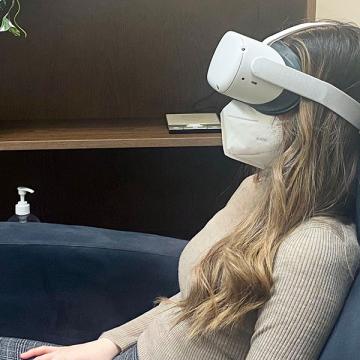
Virtual reality innovation in exposure therapy
What do you think of when you hear “virtual reality”? Virtual reality...
The systems perspective informs and is informed by our work in interprofessional and collaborative health education as well as interdisciplinary research. The related objectives articulated in the new UBC Health strategic plan, Better Health Together, build on strong relationships and collaborations with both internal and external partners. In this area, UBC Health will continue to contribute to policies and practices that shape health. We will work with health sector partners across BC to enable dialogue, activate assets, and advance policies and innovations to improve health systems at individual and community levels.
Over the next five years, UBC Health will work to advance three strategic objectives related to the health systems core area.
We will expand engagement to advance diverse community priorities, enhance learner experiences, and align research activities.
Building on the patient and public partnerships developed by UBC Health’s Patient Community Partnership for Education, we will establish a more inclusive and coordinated model for community involvement.
By embracing diverse community partnerships, UBC Health is demonstrating that ‘it takes a village’ to do what it does best...
“Over the years, UBC Health has been embedding the public/patient perspective into health education, revealing a greater recognition of the rich complexity of society,” says Darren Lauscher, public/patient representative on the UBC Health Council. “As UBC Health moves towards the transformation of integrated health systems, making the space and understanding for public/patient voices at the table may disrupt traditional ways of doing. However, such challenges are opportunities, and through collaboration, the university achieves greater authenticity and influence. By embracing diverse community partnerships, UBC Health is demonstrating that ‘it takes a village’ to do what it does best: creating the most advantageous platform for the next generation of healthcare providers and research leaders.”
We will convene experts to further collaborative health education and interdisciplinary research in response to pressing health challenges.
Recognizing the need to help address rising overdose deaths, UBC Health has partnered with the BC Centre on Substance Use (BCCSU) to improve substance use and addiction education for health profession students. This will help ensure graduates enter practice with foundational training in substance use and addiction prevention, treatment, and recovery to accompany the knowledge, skills, and attitudes needed to support people who use substances. We are also working with BCCSU to integrate content about substance use and addiction into research activities across the university.
We will help align university and sector activities to establish evidence for new approaches to health.
UBC Health connects faculty and staff who are working to advance team-based care (TBC) through the TBC @ UBC Network. TBC @ UBC enables the sharing of information to identify opportunities for collaboration and create synergies. We have identified assets at UBC that can be leveraged to support provincial team-based care efforts and continue to identify opportunities for UBC to contribute provincially. This will enable us to develop a coordinated approach for knowledge exchange between UBC and external partners, which will build the university’s capacity to contribute to team-based care initiatives across the province.
TBC @ UBC is an opportunity to build relationships through sharing. Relationships will then drive the rest.
“TBC @ UBC is an opportunity to build relationships through sharing,” says Dr. Christie Newton, Associate Professor and Associate Head, Education and Engagement in the Department of Family Practice in the Faculty of Medicine and co-facilitator of the TBC @ UBC Network. “Relationships will then drive the rest.”
Posted May 13, 2021